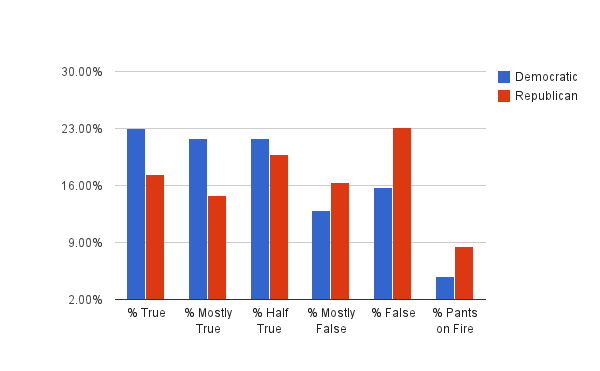Both Parties Lie, Right?
So I made some comment about the Republican convention being based on a lie or something, and my interlocutor made a comment about how, well, both parties lie. Well, sure. But the Republicans are worse than the Democrats. And she said no, they both lie about the same.
And thus, me being the type of person I am (and that type is “anal retentive”. Or “obsessive-compulsive”. Or something along those lines. Supply your own wild-ass psychoanalysis in the comments), I went looking for data.
FactCheck.org is good, but they have an annoying tendency to provide nuance and context, rather than just boiling a statement down to a single icon.
WaPo’s Fact Checker is better, with its Pinocchio-based truth scale, but when I checked, there wan’t a lot of easily-accessible data.
Which brings us to PolitiFact. They have both a cutesy-icon-based measurement, but also a lot of data. Although they allegedly have an API, I wasn’t able to find details on how to use it, so I just scraped a bunch of their web pages and grepped out the information I wanted.
And since you’ve been patiently waiting for, like, four or five paragraphs for a chart or something, here it is:

The data I used is here. There are separate sheets for Democrats and Republicans, with a count of how many statements each person or organization has made in each truth bucket (BTW, in case the phrase “truth bucket” becomes useful during this or any other campaign season, remember that you read it here first).
The first thing that jumps out is that, well, Republicans have fewer “True” and “Mostly True” statements than Democrats, and more “Mostly False”, “False”, and “Pants on Fire”. Which is kind of what I figured anyway, but it’s nice to see my opinion confirmed in chart form.
Anyway, often a person’s or organization’s page has a field that gives their political affiliation, e.g., Barack Obama is listed as “Democrat from Illinois”, while Concerned Taxpayers of America is listed as “Republican from Oregon”. I took the people and organizations listed as “Democrat from” or “Republican from” wherever, and discarded the rest.
Then it was just a matter of spreadsheetizing the data, and totting up the total number of statements by each party, counting up how many statements fall into each category, and, of course, endless fiddling about with fonts and column layouts.
The result is as objective as I could make it. You could argue that PolitiFact is biased for or against the party of your choice, but if there’s bias in the above, I don’t want to come from me.

